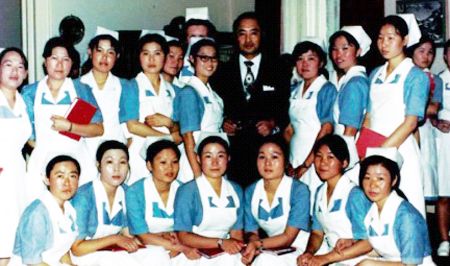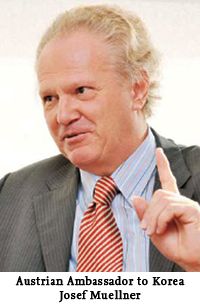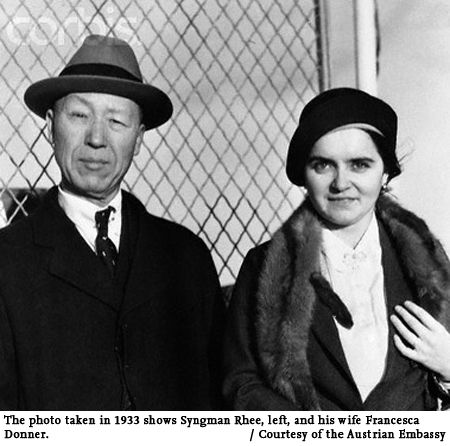Remembering 120-year Korea-Austria ties

The left photo taken in 1973 shows Korean nurses with the Korean Ambassador to Korea Lee Song-gwa in Vienna.
History is a story of people.
The 120-year-long Austria-Korea ties also remember several memorable people.
Official diplomatic relations between the Republic of Korea and the Republic of Austria opened in 1963, but, in 1892, the then Austria Hungarian Empire and Joseon Kingdom signed a bilateral treaty on commerce and navigation.
Called the “Treaty of Friendship Commerce and Navigation,” the agreement formed the basis for consular representation as well.
The Ambassador of Austria to Korea Josef Muellner shared with The Korea Times stories of some of the memorable people involved in diplomacy at this time, some of which were retrieved from the foreign ministry’s archive.
Francesca Donner (1900-1992), who became the second wife of Syngman Rhee and the first lady of Korea during his presidency, receives the most credit.
“The first encounter between Donner and Rhee took place in Geneva in the early 1930s, where Rhee, at that time a member of a government in exile, fought for the independence of his country by establishing ties with the League of Nations,”the ambassador told The Korea Times during an interview last Tuesday. Donner was working as an interpreter for the League of Nations at that time.
She became the first lady in 1948, which lasted until 1960 when the couple was forced into exile in Hawaii. After Rhee’s death in 1965, Donner returned to Austria, but, in 1970, came back to Korea where she died and was buried in 1992.
The couple’s former home Ihwajang in Ihwa-dong, Seoul, has been turned into a small museum, which their adopted son Yi In-su, takes care of.
In a diplomatic report, Peter Moser, the first Austrian ambassador to Korea (1985-1989), recalled encountering Donner who said, “During the Korean War, my popularity grew considerably, because the general Korean public confused Austria with Australia that participated in the war under the flag of the United Nations.”
Korean nurses who went Austria are a relatively unknown story, but a meaningful memory, the ambassador noted.
Compared to Germany which received more than 10,000 nurses from Korea, the number of Korean nurses settled in Austria was significantly smaller, at only around 100.
In the 1970s, “the Austrian government reported a similar shortage of staff, providing the impetus for around 100 nurses to settle down in Vienna,” Muellner said.
The Vienna General Hospital, the Otto Wagner Hospital, the Kaiswer Franz Josef Hospital and the Hospital Lainz were the main employers of the nurses.
Ahn Eak-tai (1906-1965), the composer of the Korean national anthem, and Austrian nurse Emma Freisinger were also significant figures.
In 1936, the composer was staying in Vienna studying under the Austrian conductor Felix Weingartner. Two years later, Ahn met German composer Richard Strauss for advice on his “Symphonic Fantasia Korea” part of which was later chosen as Korea’s national anthem.
Freisinger is still alive, known as a benevolent caregiver to patients with Hansen’s disease in the Daegu area.
She arrived in Korea in 1961 at the age of 29.
What was supposed to be a two-year medical mission trip became a lifelong passion, the ambassador said.
“A visit to ‘Leprosy Valley’ on the outskirts of the city (Daegu) at the beginning of her stay changed not only her own life but also the lives of countless others who received her care and compassion in the decades to follow.”
Ambassador Muellner is content with what the two countries have achieved, but says, “there is a room for further improvement.”
Korea has grown to become his country’s third most important trading partner in Asia. Bilateral trade volume reached 1.5 million euros in 2011.
What he hopes to see is a visit of the Korean president to Austria. No Korean president has officially visited Austria yet. In March 2007, Heinz Fischer became the first Austrian president to visit here.
The embassy has peppered the year with various musical events. One of the remaining ones is the Haydn Festival which will open this week in Goyang, Gyeonggi Province. <The Korea Times/Kim Se-jeong>






















































